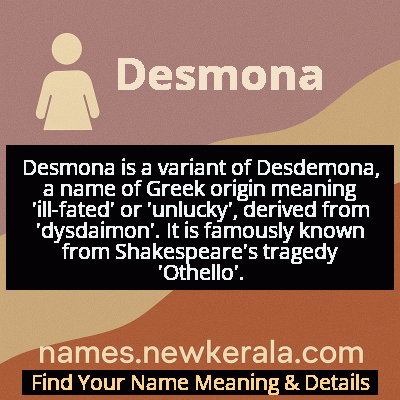Desmona Name Meaning & Details
Origin, Popularity, Numerology Analysis & Name Meaning of Desmona
Discover the origin, meaning, and cultural significance of the name DESMONA. Delve into its historical roots and explore the lasting impact it has had on communities and traditions.
Name
Desmona
Gender
Female
Origin
Greek
Lucky Number
8
Meaning of the Name - Desmona
Desmona is a variant of Desdemona, a name of Greek origin meaning 'ill-fated' or 'unlucky', derived from 'dysdaimon'. It is famously known from Shakespeare's tragedy 'Othello'.
Desmona - Complete Numerology Analysis
Your Numerology Number
Based on Pythagorean Numerology System
Ruling Planet
Saturn
Positive Nature
Ambitious, efficient, realistic, and authoritative.
Negative Traits
Materialistic, stressed, confrontational, and can be overly ambitious.
Lucky Colours
Dark blue, black.
Lucky Days
Saturday.
Lucky Stones
Blue sapphire, amethyst.
Harmony Numbers
2, 4, 6.
Best Suited Professions
Business leaders, managers, financial services, law enforcement.
What People Like About You
Leadership, determination, organizational skills.
Famous People Named Desmona
Desdemona (character)
Literary character
Central tragic figure in Shakespeare's Othello
Desmona Borg
Actress
Influential Maltese performing artist
Desmona Ahten
Author
Contemporary writer exploring mythological themes
Name Variations & International Equivalents
Click on blue names to explore their detailed meanings. Gray names with will be available soon.
Cultural & Historical Significance
Shakespeare's adoption of Desdemona in Othello (1603) transformed the name into a cultural archetype of tragic femininity. The character represents innocence destroyed by irrational jealousy and systemic injustice, making the name synonymous with victimhood in Western literary tradition. Throughout the 19th and 20th centuries, feminist reinterpretations began reclaiming Desdemona's agency, examining her as a complex character rather than merely a victim. Contemporary cultural studies often analyze Desmona as representing the silencing of women's voices and the reclamation of narrative power, making the name significant in discussions of gender, agency, and literary legacy.
Extended Personality Analysis
Those named Desmona often develop complex personality traits shaped by their name's unusual nature and literary associations. Typically, they exhibit deep emotional intelligence and sensitivity, having learned from childhood to navigate questions about their name's tragic connotations. This frequently results in individuals who are introspective, philosophical, and adept at understanding human motivation and behavior. Many Desmonas develop a quiet confidence that comes from transforming potential stigma into personal strength.
In social contexts, Desmonas tend to be selective about relationships but deeply committed to those they trust. They often possess artistic talents, particularly in writing, music, or visual arts, using creative expression to process complex emotions. Their name's association with tragedy often gives them unique perspective on resilience and recovery, making them valuable friends during difficult times. While some may initially perceive them as reserved, those who know them well appreciate their dry wit, loyalty, and capacity for profound emotional support. The name seems to cultivate individuals who understand that strength often lies in vulnerability and that true character is revealed not in avoiding suffering but in how one responds to it.
Modern Usage & Popularity
In contemporary naming practices, Desmona remains an exceptionally rare choice, typically selected by parents with strong literary backgrounds or those seeking distinctive classical names with dramatic flair. The name appears most frequently in artistic communities, academic circles, and among families with Greek cultural connections. Modern name databases indicate that Desmona has never ranked among the top 1000 names in English-speaking countries, with usage remaining consistently low but stable. Interestingly, the name has experienced minor resurgences during Shakespeare anniversaries or notable productions of Othello, suggesting its appeal remains tied to its literary heritage. Contemporary parents who choose Desmona often view the tragic associations as adding depth and character rather than being deterrents, appreciating the name's melodic quality and the opportunity it provides for discussing literature and resilience with their children. The name's rarity makes it appealing to parents seeking unique names with substantial cultural and historical weight.
Symbolic & Spiritual Meanings
Symbolically, Desmona represents the complex interplay between destiny and self-determination, external perception and internal reality. The name serves as a metaphor for how society often projects narratives onto individuals based on superficial associations, and the power of reclaiming one's own story. In psychological terms, Desmona symbolizes the transformation of potential adversity into personal strength and wisdom. The name carries connotations of beauty existing alongside suffering, innocence confronting corruption, and quiet dignity in the face of injustice.
Metaphorically, Desmona represents the idea that our greatest challenges often become the sources of our deepest insights and compassion. The name suggests that while we cannot always control what happens to us, we maintain agency in how we respond and what meaning we derive from our experiences. In literary and cultural symbolism, Desmona has evolved from representing passive victimhood to embodying the reclamation of voice and narrative power. The name ultimately symbolizes the human capacity to find meaning and purpose even in difficult circumstances, transforming what might be perceived as 'ill fortune' into a unique perspective and strength of character.

